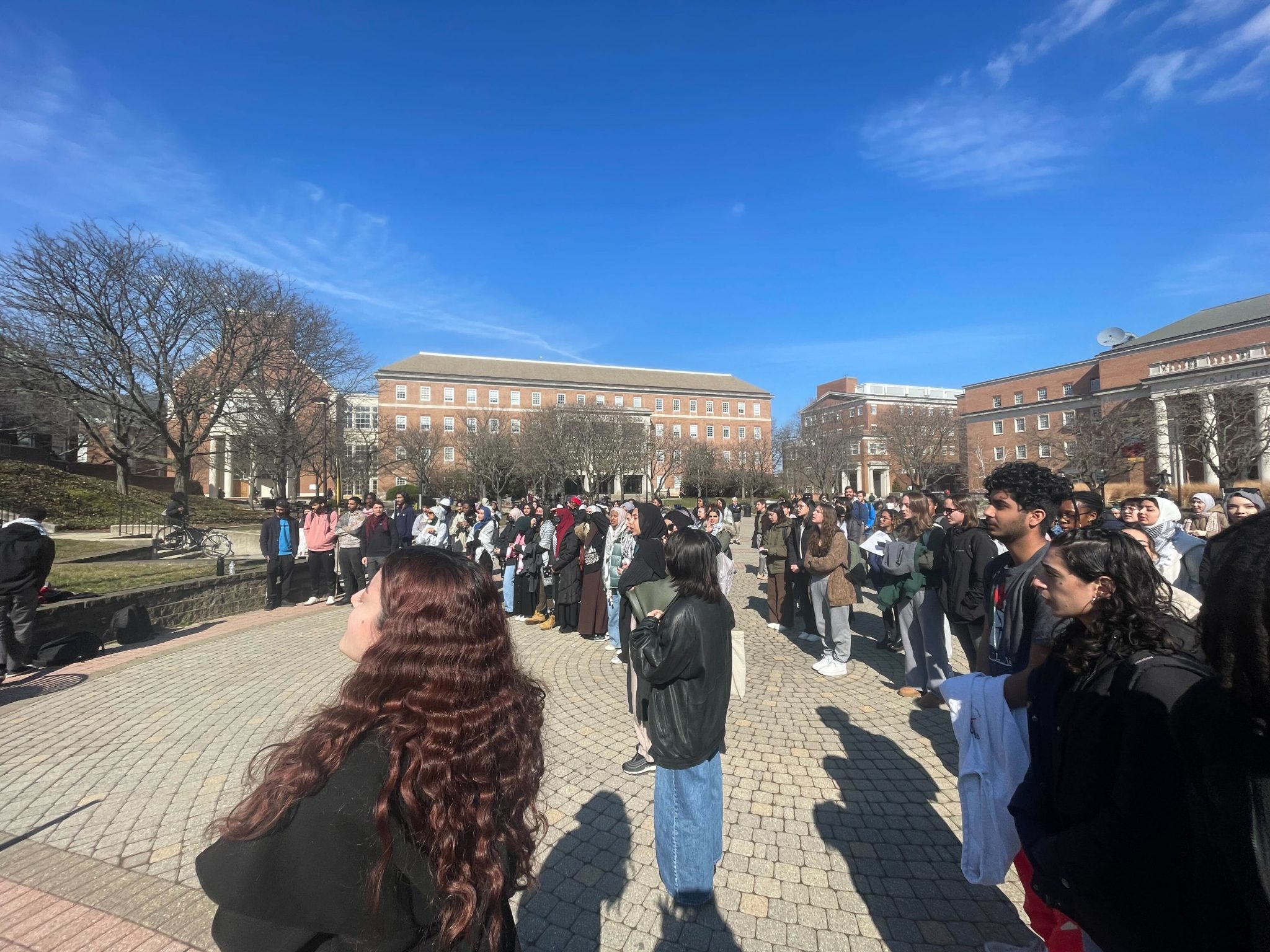More than 70 students gathered on Hornbake Plaza Tuesday to raise awareness about the deteriorating humanitarian situation amid Israel’s assault on southern Gaza.
The “Hands Off Rafah Now!” event was hosted by the University of Maryland’s Students for Justice in Palestine chapter. It was supported by this university’s Jewish Voice for Peace chapter, the Anti-Imperialist Movement at UMD and 19 other student organizations.
Demonstration attendees aimed to highlight the current situation in Rafah, a city on the southern edge of the Gaza Strip. More than half of Gaza’s 2.3 million person population has taken refuge in Rafah from fighting elsewhere, the Associated Press reported on Feb. 11.
Recent bombardment of the town has “brought devastation” as Israeli forces rescued two hostages in a raid that killed more than 60 Palestinians, the Associated Press reported on Feb. 13. Israeli Prime Minister Benjamin Netanyahu said troops may move into Rafah “soon,” the Associated Press reported Monday.
Hassan Edwan, a senior information science major, said he has family members currently in Rafah.
Edwan said it has been “very mentally straining” trying to raise funds to evacuate members of his extended family from Gaza, including his uncle whose leg is infected, he said.
“For my uncle, right now, he needs medical treatment so he needs to get out,” Edwan said. “Not just because he’s getting bombed and he’s afraid but, if he doesn’t get out of Gaza now, his condition will worsen.”
Hamas militants killed more than 1,200 people in Israel and took about 250 hostages in an attack on Oct. 7, the Associated Press reported Monday. More than 29,000 people in Palestine have been killed since Oct. 7, the Associated Press reported Monday.
[UMD student groups create flag display to remember people killed in Palestine]
Netanyahu said Israel will continue its offensive in Gaza until it reaches “total victory” over Hamas, the Associated Press reported Monday.
Event attendees wrote dozens of messages such as “Free Palestine” and “Save Gaza” in chalk on Hornbake Plaza.”
Tuesday’s demonstration also included calls for this university to divest from “corporations funding or profiting off of the Palestinian genocide,” according to a Students for Justice in Palestine Instagram post about the event.
The calls for divestment align with the #DivestUMD campaign, which calls for this university to “remove its investments from companies that commit or profit off of human rights violations,” according to the movement’s website. The movement also calls for this university to investigate its endowment and make its investments more transparent.
“Our call for divestment is driven by the conviction that our institution must embody the values it teaches,” graduate public policy student Noor Tofailli said in a speech. “We demand transparency and accountability in how our university’s resources are invested, ensuring they do not contribute to the suffering of our people or any other people.”
Tofailli also called for an “immediate and permanent ceasefire” and emphasized the lives lost are not just “statistics” but “individual lives, families shattered, dreams destroyed.”
Divya Bhat, a sophomore public policy major who attended the event, said she doesn’t want her education to come at the cost “of the lives of people in Palestine.”
[University Senate discusses free speech, interim chalking policy]
“UMD is not listening to students,” she said. “I am not okay with my tuition money being used to harm others.”
In a statement to The Diamondback, a university spokesperson said “the organizers followed university protocols” in planning the event. The spokesperson did not address The Diamondback’s request for comment on students’ divestment demands.
“UMD continues to uphold the First Amendment rights of all members of our community while prioritizing the safety of our campus,” the statement read.
Michelle Akem, a sophomore biology and information science major, said she attended the event because she has had the privilege of receiving an education and basic necessities that those in Gaza do not have.
Akem called upon this university to take a public stance about the violence in Gaza.
“If we have the opportunity to make a change … I think we should do our best to try, even if it makes us uncomfortable,” Akem said. “At the end of the day, our personal comfort is not any more important than [Palestinians’] right to live.”



